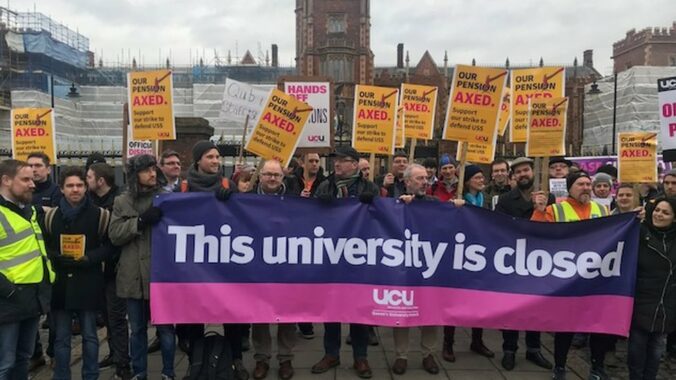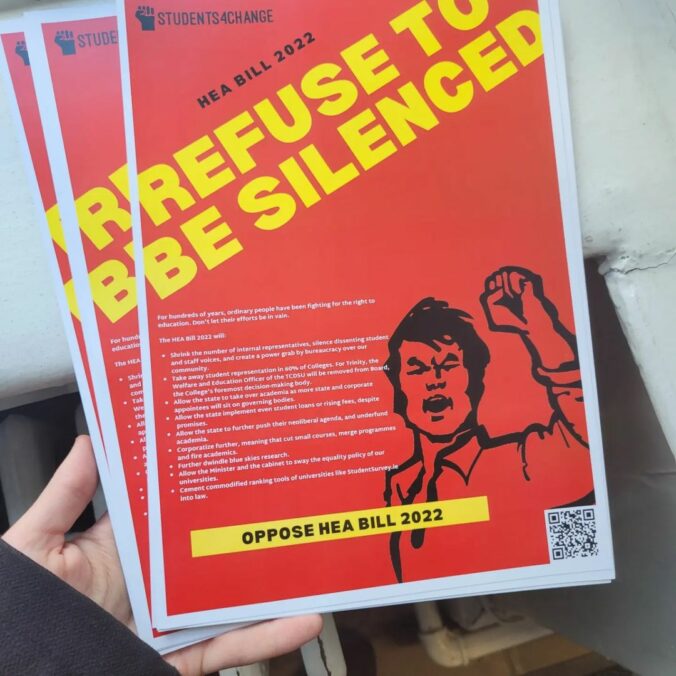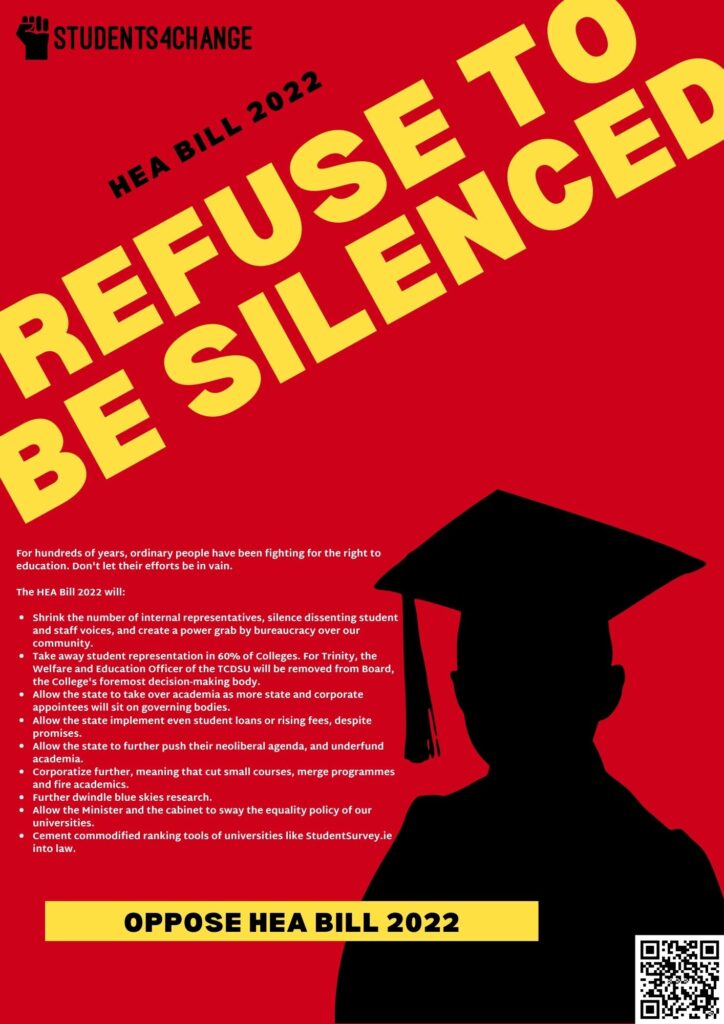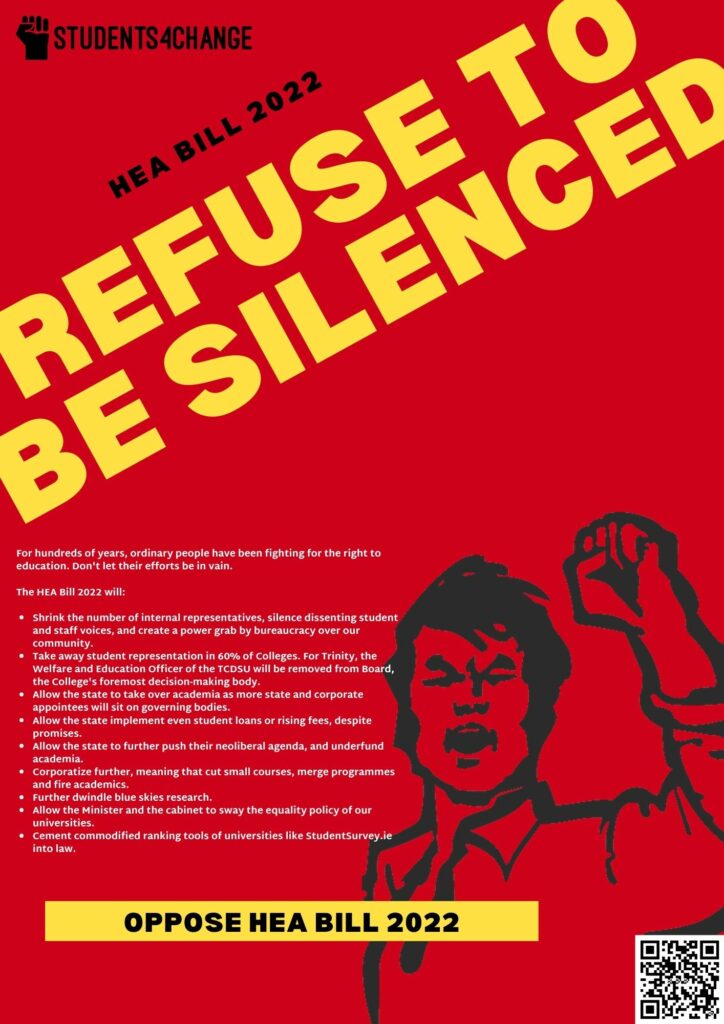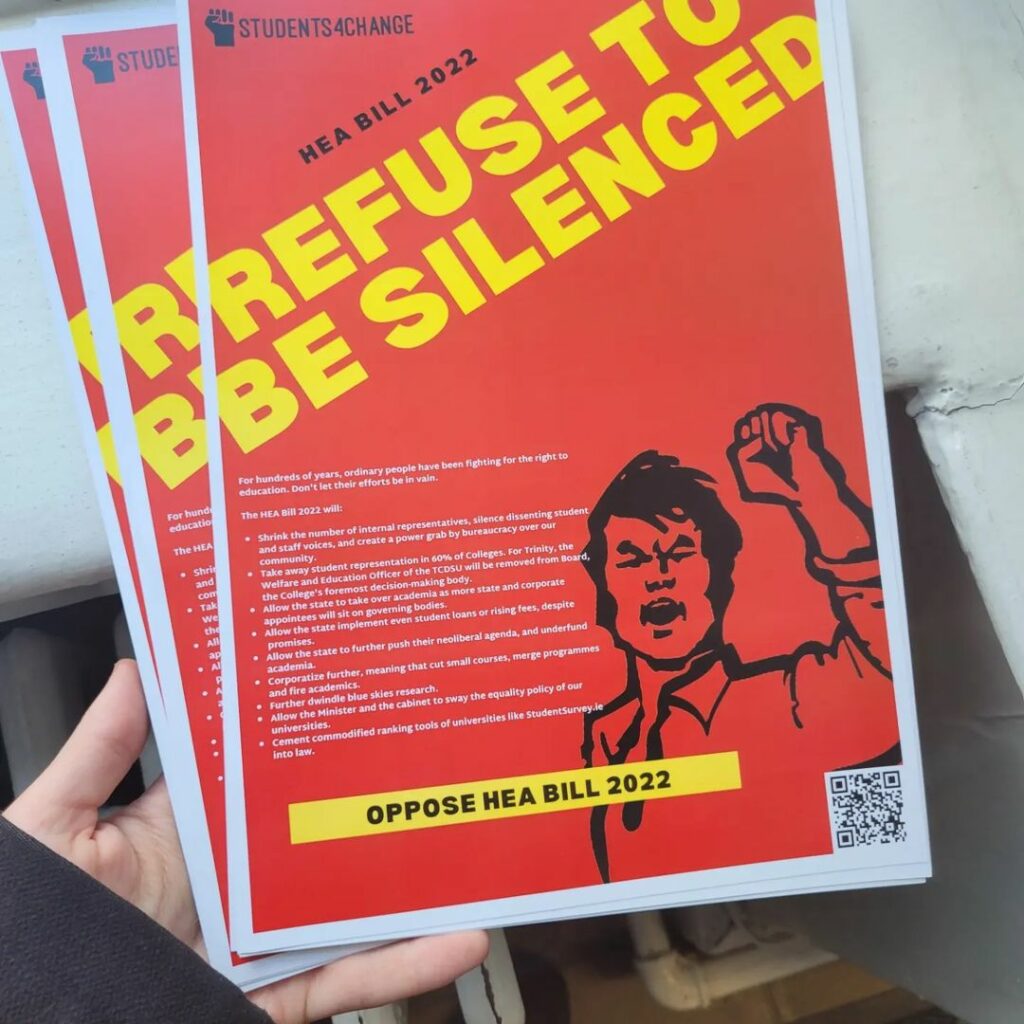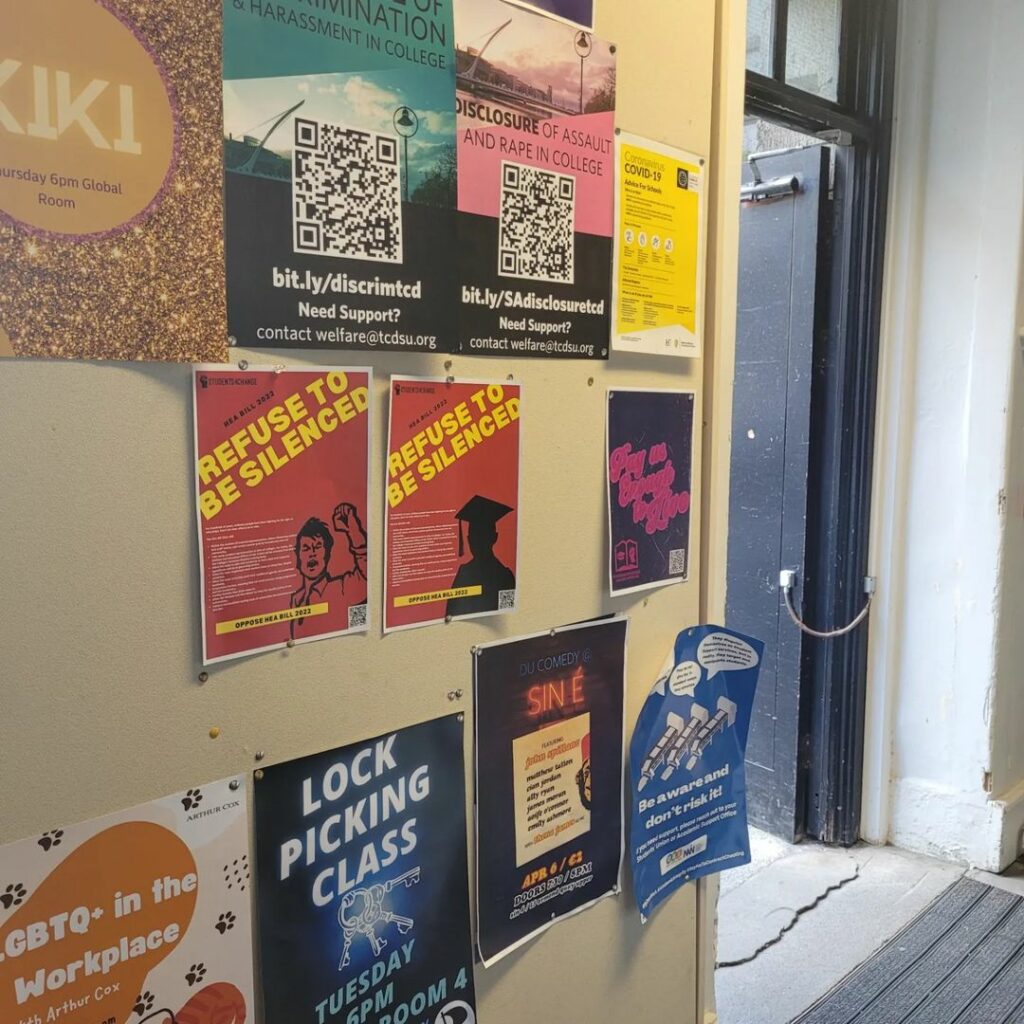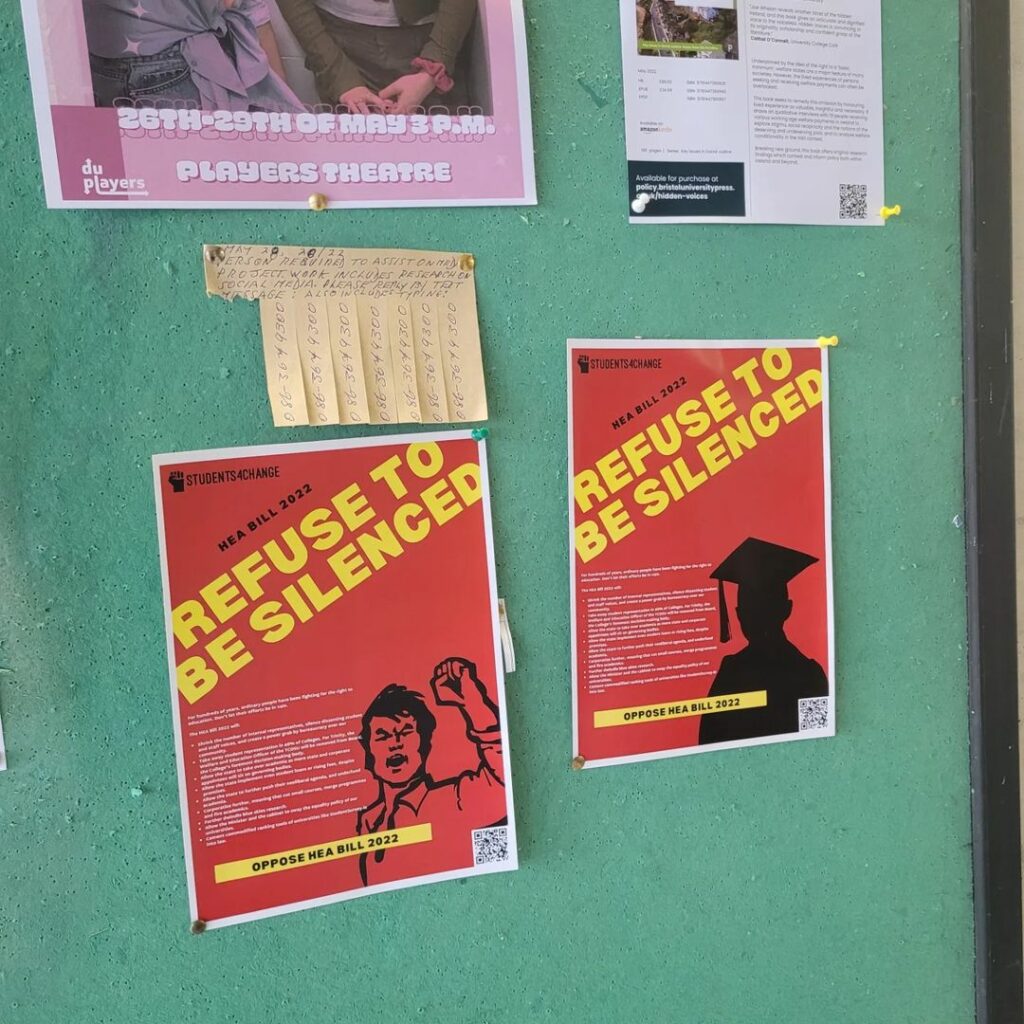László Molnárfi
This investigation blows the lid on the unfair, corrupt and evil practices of giant multinational corporations and rich real estate investors. Revelations vis-à-vis student accommodation developers and managers include:
●Lobbying against fire safety regulations, resulting in weaker structural protections such as was seen with the Grenfell Towers tragedy;
●Hundreds of millions € being made make yearly at our expense, profiting people such as Mitt Romney;
●Tax-havens like the Cayman Islands being used to funnel money and avoid paying taxes in Ireland;
●Foreign vulture funds investing in Irish real estate, driving up prices and functioning as a shadow government to the Dáil;
●Shocking behaviour of rich investors in their ivory towers, including travelling around during Covid-19 to private islands while neglecting students’ wellbeing, who they see as cash cows not even deserving of tenant rights;
● Government’s failure to fund third-level education leading to corporatisation of Universities and an increase of ~5000 € in rent over the past 20 years.
Public sites studied include Trinity College Dublin’s Halls and On-Campus apartments.
Private sites studied include apartments by Uninest/The Student Housing Company (e.g. Kavanaugh Court), Aparto (e.g. Binary Hub), Fresh Student Living (e.g. Brickworks), HEYDAY Management (e.g. Carman’s Hall), Prime Student Living (e.g. Trinity View), Host (e.g. Point Campus), LIV Student (e.g. Church Street) and more.
What and who exactly is behind this and what can we do to stand up for ourselves? If this question interests you, read on!
Section I. Introduction
“Over the past 28 years, the GSA IM management team has transformed student accommodation into an institutional asset-grade, real estate class.”
- Global Student Accommodation, one of the biggest managers and developers of student property.
According to a report published by the Government of Ireland, from 2016 to 2019 a total of 8,229 bed-spaces were built for student accommodation across the country.
Out of those 8,229 bed-spaces, a staggering 6,900 representing 83% were privately financed. The Irish government has a heavy reliance on the private sector to build student accommodation with only 4 out of 32 sites being built by Universities.
More than 90% of these are only available for 840 € per month or more.
This pamphlet analyses these recent constructions, amongst others, and explains why your student accommodation is so f*cking expensive through investigating company ownership, financial records and business links to Big Money such as large multinational corporations with rich investors. In addition, a section is dedicated to exploring the increasing corporatisation of Universities spurred on by failure of the government to adequately fund academia and the worsening conditions within publicly-financed accommodations.
With the Simon Community in 2019 estimating 18,000 homeless and 198,358 empty houses in 2017 in Ireland, the ratio-economic justification for the soon-to-be uncovered exploitative and immoral practices of the businesses discussed becomes moot. The bigger problem is, of course, that the very economic system we live under is set up in such a way as to allow, even incentivize this sort of abhorrent behavior.
Section II. Publicly-funded student accommodation
With student accommodation provided by Universities, there can be no such grandiose shocking revelations as with its private counterparts. No links with the Cayman Islands can be uncovered and connections to cunning politicians decried, but our economic system is still accountable by proxy.
In this example, the sites of Trinity College Dublin will be explored. This includes Trinity Halls and On-Campus (e.g. Goldsmith Hall, GMB, Pearse Street and Oisin House) residences.
According to Trinity’s financial statements for the year 2018-2019, the rental income was 12,866 million € from these sites, which is re-invested into academia. For this, students can be juiced well over 8000 € per year. In 1999, this same figure stood at most just over 3000 €, adjusted for inflation.
Financial starvation of Universities by the Irish government has directly led to corporatization, a process whereby the college acts as a for-profit business to make up for the loss of state investment. Just in February 2020, Trinity’s Commercial Revenue Unit recommended yet another 4% rent hike, which was taken off the table only following threats of direct action by students.
4% is the maximum percentage allowed, a legislation against which the Irish Universities Association (IUA) of course lobbied.
At the same time, in 2017 Provost Patrick Prendergast purchased a 1,95 million € city centre apartment with College funds, “due to the noise of the construction works at the time the Luas Cross City was being built”. On-Campus students, of course, did not enjoy the same privilege of moving into a shiny new apartment.
At the same time, in 2019, students arriving at the GMB site found mould growing on walls, paint falling off the walls and stained carpets.
At the same time, foreign students arriving into Dublin are practically forced either into public or private student accommodation due to not knowing the local rental market.
At the same time, the Warden(s) at Trinity Halls abuse residents, telling them “you’re f*cking disgusting”, comparing an American student to Trump for not being “covid-conscientious” and telling international students that they will be “kicked out of College” and “sent back home”.
At the same time, these people are the only source of on-site medical support, threatening the lives of students. “There was a serious medical emergency at Trinity Halls a few weeks back… it took 40 minutes for the ambulance to arrive and the Warden(s) had to deal with it, ” says a resident.
No money can be spared for the wellbeing of students by the powers that be, it seems.
This failure of the Irish government to fund third-level education exemplifies the failure of politicians to pass any legislation that favours students as opposed to their obsession with money.
Section III. Privately-funded student accommodation
On the other hand, investigation of student accommodation provided by the private market, which started with a peek at Aparto’s Binary Hub, leads to a shocking network of sprawling multinationals, banks, dangerous lobbying, cornered markets, huge investment funds – often vultures – and capital management companies headquartered off-shore in far-away corners of the world all with one goal in mind.
This goal, of course, is profit for the 1% at the expense of the 99%. For the rich investors, at your expense. Here will follow a few examples of both real estate companies and property management companies, which tango together on the dancefloor of capitalism to make profits.
If you live in Binary Hub or any other the student accomodation run by Aparto, you should probably know that:
· Your money goes to Texas-based Hines, a multinational real estate investment company which made 45,856 million $ in rental revenue alone in 2019. This includes luxury apartments for expats in Moscow with the investment of Qatar’s state fund.
· Despite the above, the person in charge of Irish real estate, Brian Moran, lobbied the government to not update fire safety regulations so as to not make construction ’more expensive’. This has resulted in weaker safety regulations in Irish apartments which have been heavily criticized by experts. They learned nothing then, from the tragic Grenfell Tower fire and its 72 dead!
· In addition, in the case of Binary Hub, your money also goes to property developers such as 360 Developments, a subsidiary of US-based giant Oaktree Capital, one of the largest vulture funds in existence.
· Anecdotally, a friend of mine rented a room at Binary Hub, but only ended up staying for 40 days due to the fact that College was confirmed to be online-only. Despite paying over 5000 euros for one semester, he has not been able to get a refund of any sort.
When asked by a UN rapporteur in 2019 March „that heavy investment by funds and trusts into rental property is making the market unaffordable for individuals and led to the “financialisation of housing”, Hines simply responded that „Any supply into the market is helping to close the gap [with demand]”. They conveniently ignore the fact that despite de facto availability of supply, prices have not been going down, in fact they have been steadily rising. If the economic system we live under makes it possible to price gouge tenants, perhaps it’s time to change that system.
If you live in Kavanaugh Court, or any other accommodation run by Uninest or The Student Housing Company, you should probably know that:
· Your money goes to Global Student Accommodation (GSA), a huge company registered in the Cayman Islands. Its investment branch, such as GSA Coral, has a target return of + 8% annually – from its total assets of £567 million as of December 2020 – which it must meet to keep investor confidence. As such, rents are made as high as possible.
o Money is funnelled through tax-havens like Luxembourg, with companies such as „Unicity XI Edinburgh S.a.r.l” acting as intermediaries to transfer funds.
· However, their Board of Directors and Executive Team is commendably very diverse, with 14 out of the 15 members being white males and even one woman!
· Its property development branch’s Aaron Bailey, in conjunction with Davy Global Fund’s Robin Potter Cogan, have developed or invested in at least 8 sites around Ireland.
· The Davy Global Fund, which boasts of €1.5bn of Irish commercial property assets under management, was accused and found guilty of mismanaging a mentally ill 20-year old’s family heritage from his dead parents in 2014, encouraging him to invest in risky ventures so as to profit the company.
If you live in Brickworks, the student accommodation on Brickfield Lane built by Brickfield Investments, you should probably know that:
· Up until 2018, your money went to Bain Capital Ltd, the private-equity firm co-founded by the 2012 US Presidential election’s Republican candidate Mitt Romney, through a Cayman Islands’ registered company called BCC DSS 2017 Ireland. He made a personal fortune of 250 million $ off his ventures.
o BCC DSS 2017 has been linked with physical threats and forced evictions of Irish property to pursue business goals, despite tenants being up to date on their rent.
· As of 2018, your money goes to Invesco Real Estate, an S&P 500 investment management company that made 808,2 million $ of profit in 2019.
In fact, if you live in any of the 66 other accommodations managed by Fresh Student Living and therefore the Fresh Property Group, you should probably know that your money goes to the Watkins Jones and Sons’ property group, which had a revenue of £354.1 million in 2020, the bulk of which comes from students. ’A resilient performance despite the challenging conditions caused by Covid-19’, their annual financial report says.
· The report, of course, did not mention that students who would not stay in their rooms due to Covid-19 weren’t offered any refunds and still had to pay.
If you live in Carman’s Hall, the student accommodation built by the Crosslane Property Group, or alternatively in any accommodation managed by Prime Student Living (e.g. Trinity View) which is a subsidiary of the former, you should probably know that:
· According to Crosslane’s website, they have an annual rental income of up to 36 million £ with properties in 22 different cities. Prime Student Living alone has 562 million british pounds worth of assets under its management.
In fact, as a student living in an accommodation managed by HEYDAY Management, you should probably know that your money goes to a company registered in tax-haven Luxembourg called Carlyle Europe Realty Fund (S.C.Sp) through an intermediary called CER Ireland SA Dev and CER Ireland SA Holdings. One of the directors of the latter, Aidrian Baillie, also sits on the boards of 33 other companies, a large majority of these being vulture funds like US-based giant BlackRock. These types of funds are responsible for tens of thousands of evictions all across Ireland.
The Carlyle Group has a total equity of 245.8 billion $ as of 2020. Despite some attempts at greenwashing, in 2019 October they launched the Boru Energy venture investing as much as 1 billion $ for fossil fuel deals across Sub-Saharan Africa.
If you live in Point Campus, or any other accommodation managed by Host, you should probably know that:
· Your money goes to the O’Flynn Group and BlackRock, headed by Michael O’Flynn, Ireland’s 120th richest person boasting a net worth of 132 million € in 2019.
· His property development firm, Tiger Developments is jointly run with Goodbody Stockbrokers, a stockbroking firm which will soon be 100% owned by the Chinese state.
· He, despite the objections of his family, built a 9,500sq ft mansion in 2004, which has been criticized because it ’would be out of scale in the rural area, and might impinge on views of the historic Kilcrea Abbey, which is situated 600 metres north-east of the site.’
· As of December 2020, if you live in Point Campus, your money goes to the Deutsche Bank, which through its asset management branch has 700 billion € worth of assets.
And the list goes on, and the list criss-crosses and the list circles.
· If you live in any LIV Student accommodation, such as Church Street in Dublin, know that the aforementioned site alone made close to 2.3 million € in 2018 from its 215 beds. This goes to Valeo Groupe Limited.
· If you live in properties developed by (comparably) smaller firms, such as Ziggurat, know that they are often bought up by bigger fish, such as Hines. For example, Montrose was sold for €37.6 million by Ziggurat to Hines in 2017. The market as it is currently regulated does not promote competition, but collusion and eventual cornering of an industry by a few giants.
· If you live in any Hatch Student Living accommodations, you should know that your money goes to Elkstone Capital, whose founder Alan Merriman has been quoted as saying ’Money does make money, that’s the reality’ when talking about his investment branch.
· Let’s do an exercise. If you live in a student accommodation not listed here, go on Google and try to find out who ultimately owns it! Somehow I doubt it will be a small family business. I can suggest the Iveragh Group or Hattington Student for practice…
In the end, you are making money for people like Mark O’Connor, a rich investor from London involved in joint ventures with GSA and private equity company Harrison Street. Just in January 2021, in the midst of Covid-19, the IrishMirror.ie newspaper reported that ’Montana Brown [from Love Island] has been enjoying an extended Barbados break with hunky real estate executive Mark O’Connor from London’. How nice it is for them to be enjoying a nice break while everyone else has to deal with Covid-19!
At the same time, more than 50 homeless persons died in 2020 in Ireland.
At the same time, exchange students arriving into Dublin are milked like (cash) cows for their money on a rotational basis, not even given proper tenancies. Students have as many rights as a hotel resident, with no privacy, evidenced by random visits to bedrooms, and able to be kicked out any time.
At the same time, despite much reduced access to facilities and a large number of students leaving their accommodations during Covid-19, there were en masse no reductions in rent or any refunds.
At the same time, a Guardian investigation in 2018 found that some of these companies, as expected, pay little to no taxes – the same tax that is used to fund social nets, for example for the homeless. Research for One GSA-owned student accommodation In Bristol „where students pay £161 a week for an en-suite single room, show that in 2016 it collected a rental income of £2.2m and paid £10,000 in income tax”, as money was funneled through Luxembourg.
At the same time, 1 in 4 TDs in the Dail are landlords. The parliament of what should be the Irish peoples’ has turned into a parliament of the corrupt, by way of capital, making solving the housing crisis a mockery of itself. Surely, inviting the vulture funds with open arms will help the economy recover… it has led but to tragedy for many Irish families.
· A recent bill introduced by the USI in conjunction with the Trinity College Dublin Students’ Union has gained the support of 56 opposition TDs. The Minister for Housing has indicated that the government will not oppose it. This bill will make sure students can cancel their contracts with a 28-day notice and that accommodation providers only charge monthly rents. These are small victories, but will facilitate rent strikes and other direct action.
Section IV. What is to be done?
The system is held up by those on the bottom of the pyramid – us, and all is needed is to pull out our capital from under their feet and make them sweat. To show them who really is in power. However, this can only work if we take an individual risk for the collective good and create a mass movement which links in to the larger rallying cry against the elites’ complacency and neglect of the housing crisis.
In December 2020, students in the UK carried out a massive rent strike, earning them many concessions from the powers that be, including a 30% reduction in rent.
Similarly, we demand immediate rent slashes of at least 25%, the intensified provision of publicly-funded student accommodation and the introduction of proper legal protections for student tenants. #EducationForAll!
So, support your local CATU branch and join up to the TCD Renters’ Union. They are planning direct action such as rent strikes and occupations. If done by uniting tenants and collectively fighting for our interests, and if well organized, we can finally end this economic oppression, which exists only to profit the select few and fortunate!
Further reading(s) and action point(s):
Please the PDF version of this pamphlet, news and specific actions points that you can take right now here.
Source(s):
Our pamphlet’s original sources, that is company records, ownership documents and financial statements which were mostly gathered from different registries can be consulted here.
Homelessness and empty homes data from the Simon Community
Quarter 3 2019 Progress Report on the National Student Accommodation Strategy
Estimated cost of accommodations (note that this is 2016-2019 Q2, but estimated similar for 2016-2019 Q3)
Trinity College Dublin financial statements
Outrage at plans for TCD rent rise 1999
Proposed 4% rent hike in February 2020
IUA Lobbying against rent caps
Provost’s 1,95 million € apartment
Conditions at GMB
Trinity Halls abuse by Wardens
Lobbying information can be found here and here.
Hines and UN rapporteur
Please note that the claim of available supply is made inter alia in regards with empty houses, and the unaffordability of housing in Dublin in general, hotels, luxury housing and the built-to-rent schemes. There is de facto additional supply of housing which is not reflected in official government statistics, which indicate rise in the supply anyways.
Davy Group and neglect of mentally-ill person
Mitt Romney’s net worth
BCC DSS 2017 and evictions
Vulture funds and evictions
Michael O’Flynn’s mansion
‘Money does make money, that’s the reality’
Montana Brown’s and Mark O’Connor’s nice holiday during Covid-19
Homeless deaths in 2020
Guardian investigation into GSA 2018
1 in 4 TDs are landlords




